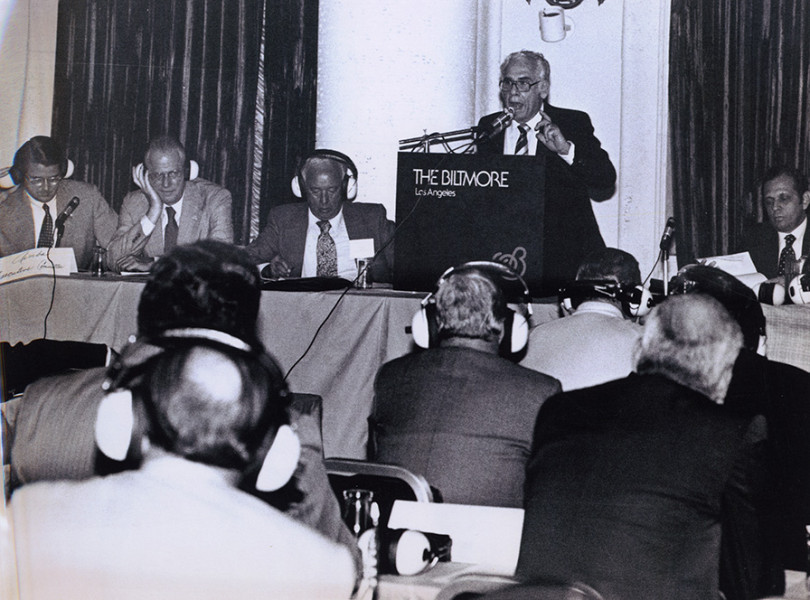
September 10, 1979, Association International Baseball Amateur (AINBA) Extraordinary Congress at the Biltmore Hotel, Los Angeles to encourage baseball as a demonstration sport for the 1984 Games of the XXIII Olympiad in L.A. (L-R) Dodger President Peter O’Malley; Baseball Commissioner Bowie Kuhn; USC Head Baseball Coach Rod Dedeaux; (at microphone) Manuel Gonzalez Guerra, Cuba, President, AINBA; Carlos Garcia, President, Nicaraguan Baseball and Executive Vice President, AINBA.
International Baseball Meeting For the Ages
By Robert Schweppe
The dream of Olympic baseball became a reality with planning, energy, dedication, focus and collaboration.
On May 18, 1978, the 1984 Games of the XXIII Olympiad were awarded to Los Angeles. A Greenville College (Illinois), Vice President and the college’s baseball coach, Dr. Bob Smith, had an idea. He was also president of the United States Baseball Federation, the leading amateur baseball group in America. If the Olympics were going to be held in the United States, he thought it would be good for baseball, the International Olympic Committee and the growth of the game to have it as part of those Games.
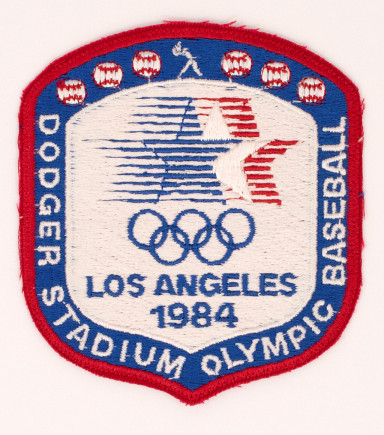
The patch worn by the Los Angeles Dodgers during the 1984 season representing the Olympic Baseball exhibition tournament at Dodger Stadium during the Games of the XXIII Olympiad in Los Angeles. Baseball’s largest involvement in the Olympics took place at the time as a demonstration sport with eight teams competing.
The scholarly Dr. Smith notified USC baseball coaching legend Rod Dedeaux, who had been active for decades in international baseball including as head coach of the USA baseball team that played an exhibition game in Japan as part of the 1964 Tokyo Olympic Games. Smith appreciated Dedeaux’s accomplishments, expertise and experience in international baseball. Dr. Smith told him his hopes for 1984.
Dedeaux introduced Dr. Smith to Peter O’Malley, President of the Los Angeles Dodgers, as the one person who could help accomplish the idea and make it a reality. O’Malley realized quickly the advantages if enough fans knew more about baseball around the world. For his part, O’Malley understood he had to have the support of the Commissioner of Baseball, Bowie Kuhn. Plans were put in place and phone calls were made to begin the initial phase of their quest.
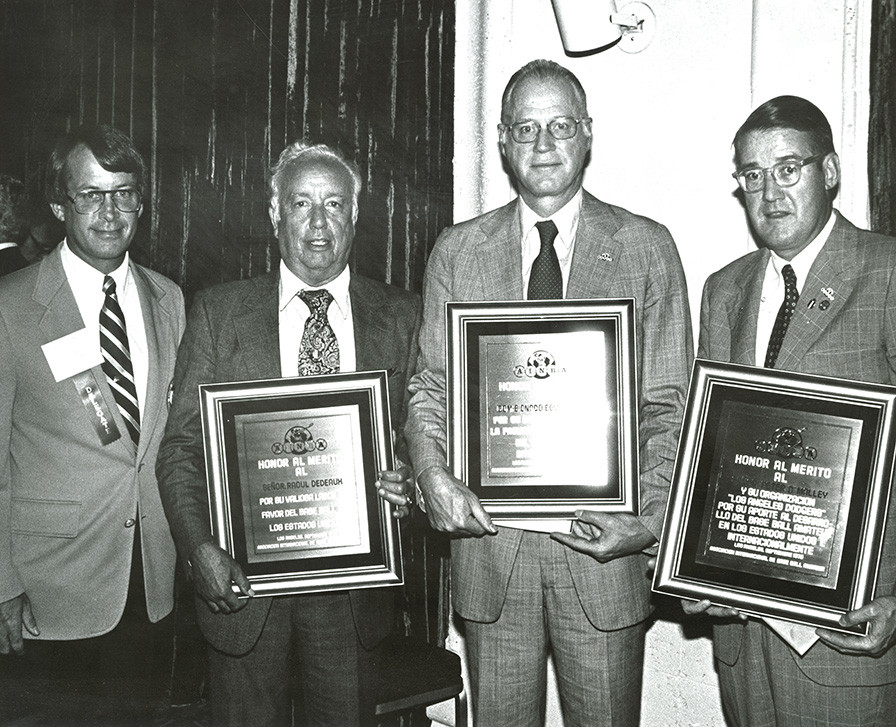
September 10, 1979, Biltmore Hotel, Los Angeles, (L-R) Dr. Bob Smith, President, United States Baseball Federation; USC Head Baseball Coach Rod Dedeaux; Baseball Commissioner Bowie Kuhn; and Dodger President Peter O’Malley. Dedeaux and Kuhn hold AINBA Honor of Merit plaques for their support of amateur baseball in the U.S., while O’Malley’s plaque is in appreciation of support of amateur baseball in the U.S. and internationally.
Because many international dignitaries visited Dodgertown, Vero Beach, Florida, therefore it was an appropriate place to start the planning process. At the time, it was where the Dodgers held their spring training camp since 1948. Dr. Smith traveled from Chicago to Vero Beach in March, 1979 and met with O’Malley and the real work began.
The American baseball foursome of Dr. Smith, Coach Dedeaux, Baseball Commissioner Kuhn and O’Malley also knew the support for baseball in the Olympic Games would have to be worldwide, otherwise, adding a sport that had little exposure would be a difficult challenge.
O’Malley focused on the mission in late April and early May, beginning the intensive, concentrated effort to gain support around the world. Lunches, dinners, and regular conference telephone calls were part of his daily schedule. Activity stepped up in July with more calls and meetings and a plan developed in place to bring baseball representatives from 30 countries to Los Angeles to have a three-day, one-of-a-kind baseball summit meeting with the goal to get the International Olympic Committee’s attention and establish it as a significant demonstration sport.
The baseball leaders came from around the world, most traveling thousands of miles. They had a purpose, a dream, and their love for baseball.
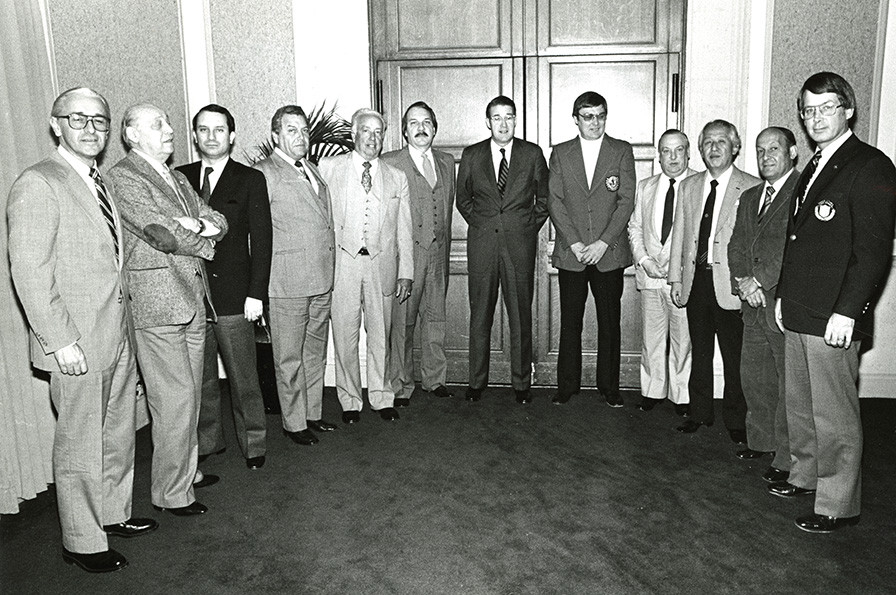
September, 1979, Biltmore Hotel, Los Angeles, AINBA Extraordinary Congress of international baseball leaders from 30 countries to discuss including baseball for future Olympic Games. (L-R) Hal Smeltzly, United States; Bruno Beneck, Italy; Max Ceccotti, Italy; Unidentified; USC Head Baseball Coach Rod Dedeaux; Osvaldo Gil, Puerto Rico; Dodger President Peter O’Malley; Cas Pielak, Canada; Guus van der Heijden, The Netherlands; Eiichiro Yamamoto, Japan; Jesus Chirinos, Venezuela; and Dr. Bob Smith, President, United States Baseball Federation.
The Extraordinary Congress of the Association International Baseball Amateur (AINBA) grand meeting was held September 10-12, 1979 at the Los Angeles Biltmore Hotel. Opening remarks were from USC Coach Dedeaux, Baseball Commissioner Kuhn, and O’Malley. Translators and headphones were arranged within the hotel ballroom by O’Malley so everyone could listen, engage in discussion and provide input as how to plan success.
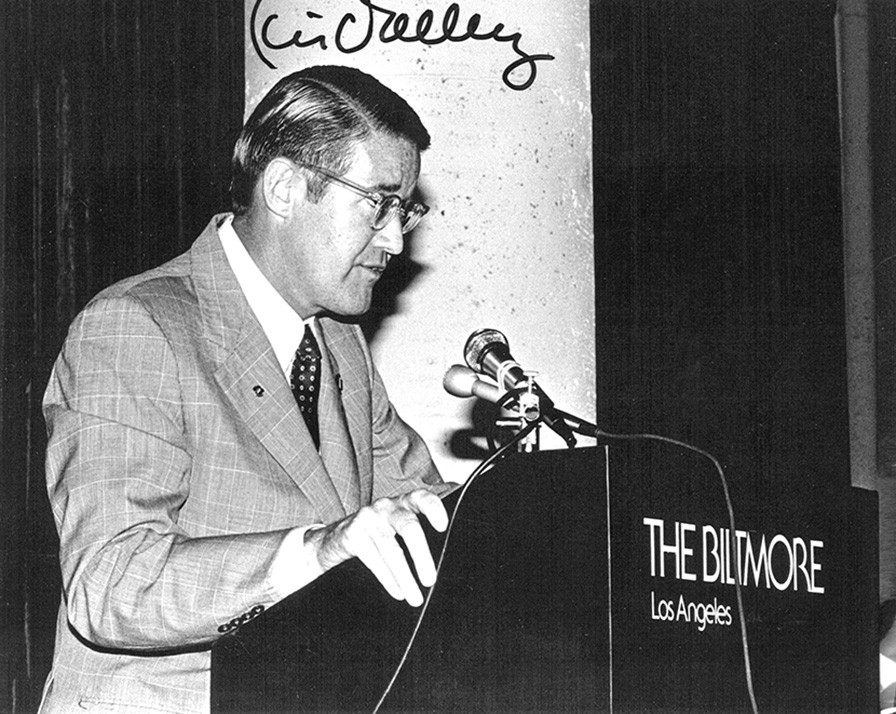
Dodger President Peter O’Malley, who planned and hosted the AINBA Extraordinary Congress in Los Angeles, makes opening remarks on September 10, 1979 welcoming baseball leaders from 30 countries and discussing his commitment to making baseball a permanent part of the Olympic Games.
The Congress, organized and hosted by Peter O’Malley, stated a simple goal. They would make the effort for the first time in Olympic history to include baseball as competition for the 1984 Games of the XXIII Olympiad in Los Angeles. Easy to say, but complex in its execution.
At the time, baseball was the most international of major sports in the United States and this was a clear international crowd. Baseball Almanac
Baseball leaders in attendance were from Argentina (Juan Carlos Pena); Australia (John Anderson); Belgium (Gaston Panaye, Albert Aarts); Brazil (Issao Nishi); Canada (Casper Pielak, Al Elliott); Chile (Aldo Picozzi Bilbao, Alfredo Roman); Colombia (Alfredo Morales; Clemo Haydar, Guillermo Valencia); Cuba, (Manuel Gonzalez Guerra, President, Association International Baseball Amateur; Napoleon Quevedo, Alfredo Casana); Dominican Republic (Dario Cano del Rio); Ecuador (Francisco Roca); France (Joaquin Rodriguez); Guatemala (Cesar Mendezabal, Raul Lopez, Erwin Quezada, Rolando Quezada, Abdon Rodriguez); Honduras (Jose Ruban Lainez); Italy (Bruno Beneck, Vice President, Association International Baseball Amateur; Massimo Ceccotti, Aldo Notari); Japan (Eiichiro Yamamoto); Korea (In Chul Choi, Duck J. Lee, Woo Duk Kim); Mexico (Miguel Oropeza); Netherland Antilles (Sylvan Paul, Heraclio Henriquez); The Netherlands (Guus van der Heijden, Gerard Voogd); Nicaragua (Carlos Garcia, Executive Vice President, Association International Baseball Amateur); Panama (Rene Gonzalez, Rogelio Eloy Garcia); Peru (Gerardo Maruy Takayama); Philippines (Charles Parsons, Peter Parsons); Puerto Rico (Osvaldo Gil, Elfren Bernier); South Africa (Arthur Berezowski); Spain (Francisco Gomez, Francisco Gomez, Jr.); Sweden (Ake Halvarson); Taiwan (Kuo-Cheng Hsieh, Hsu-Fu Huang); United States (Jerry Miles, John Strahl, John Cooper, Bill Arce, Julio Blanco-Herrera, Lew Hays, Hal Smeltzly, Marty Dittmer, Jack Stallings, Dick Case, Danny Litwhiler, Robert E. Smith, W.P. Fehring, Rod Dedeaux); and Venezuela (Jesus O. Chirinos).
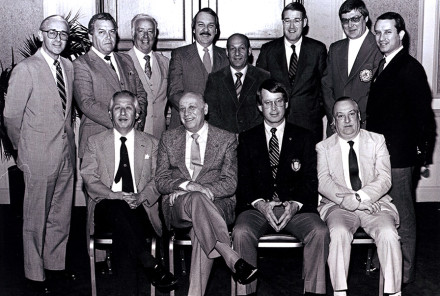
September, 1979, Biltmore Hotel, Los Angeles, AINBA Extraordinary Congress, (L-R front row): Eiichiro Yamamoto, Japan; Bruno Beneck, Italy, Vice President, AINBA; Dr. Bob Smith, President, US Baseball Federation; Guus van der Heijden, the Netherlands; (L-R back row) Hal Smeltzly, United States; unidentified; Rod Dedeaux, USC Head Baseball Coach; Osvaldo Gil, President, Puerto Rico Baseball Association; Jesus Chirinos, Venezuela; Dodger President Peter O’Malley; Cas Pielak, President, Canada Baseball; and Max Ceccotti, Italy Baseball representative.
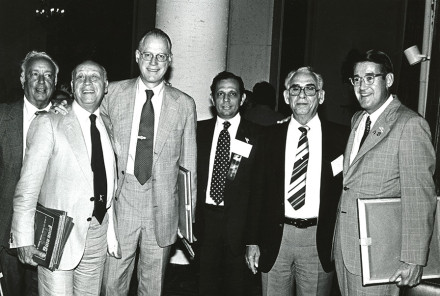
September 10, 1979, Biltmore Hotel, Los Angeles, AINBA Extraordinary Congress, (L-R) Rod Dedeaux, Chairman, United States Baseball Federation Olympic Committee and USC head baseball coach; Bruno Beneck, President, Baseball Federation of Italy; Bowie Kuhn, Baseball Commissioner; Carlos J. Garcia, Nicaragua and AINBA Executive Vice President; Manuel Gonzalez Guerra, Cuba and President, AINBA; and Dodger President Peter O’Malley.
O’Malley hosted the international baseball leaders and they were introduced at Dodger Stadium in a pre-game ceremony September 12, 1979. The Boy Scouts of America entered the field presenting the national flag of each of the countries represented.
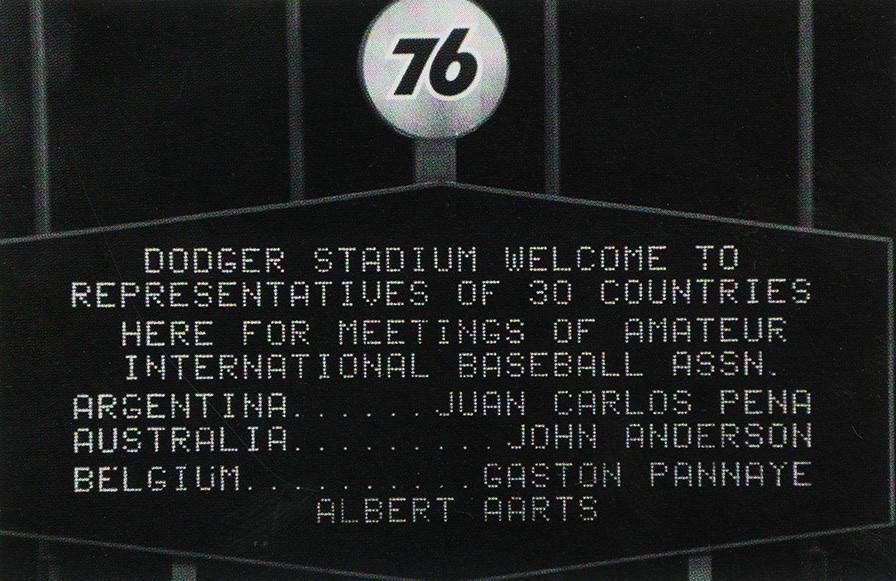
September 12, 1979, Dodger Stadium message board welcomes representatives of 30 countries for an Extraordinary Congress of Association International Baseball Amateur (AINBA) to discuss initial plans to include baseball into the 1984 Games of the XIII Olympiad in Los Angeles.
The Los Angeles Olympic Organizing Committee (LAOOC), the United States Olympic Committee, and the International Olympic Committee (IOC) all had to be persuaded to include baseball. This would take an international baseball effort never before undertaken to convince the powers that be of the value of baseball to the Olympics.
But the veteran baseball officials in the 1979 meeting were unified and knew this about their game – efforts would be based as a long-term plan. Baseball development takes time, effort, energy, and patience. There is no way to accelerate the timeline, other than getting countries, teams, and players to play.
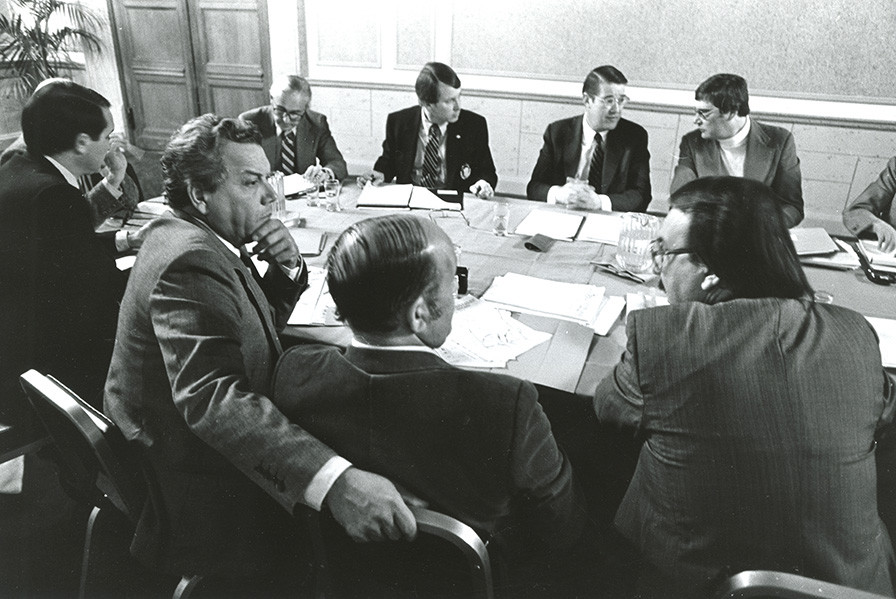
September, 1979, Biltmore Hotel, Los Angeles, Peter O’Malley (facing, second from right) is seated alongside Dr. Robert Smith, President, United States Baseball Federation during the AINBA Extraordinary Congress of international baseball leaders to encourage baseball in upcoming Olympic Games. Richard Case, a USA Baseball official is to the left of Dr. Smith, while Cas Pielak of Canada is to the right of O’Malley.
The intensive meetings for three days were an unqualified success for many reasons because with a united effort the international baseball leaders were able to obtain one of only two slots for a demonstration sport in the 1984 Games of the XXIII Olympiad in Los Angeles. Nine sports competed for those spots. Commissioner Kuhn representing Major League Baseball gave his unwavering support for international growth. IOC President Juan Antonio Samaranch viewed first-hand the great competition and how popular baseball was with fans stating after the 1984 tournament that it was on course to be included as an official gold medal sport. A surge in participating countries, particularly in Europe and Asia, benefitting from financial assistance, helped develop more amateur players around the world in the decades that followed. In 1986, baseball was voted by the IOC to be included as an official Olympic sport with the first gold medal competition in the 1992 Barcelona Games. In 2025, 128 countries are competing around the world in baseball, more than four times the number when the AINBA meeting took place.
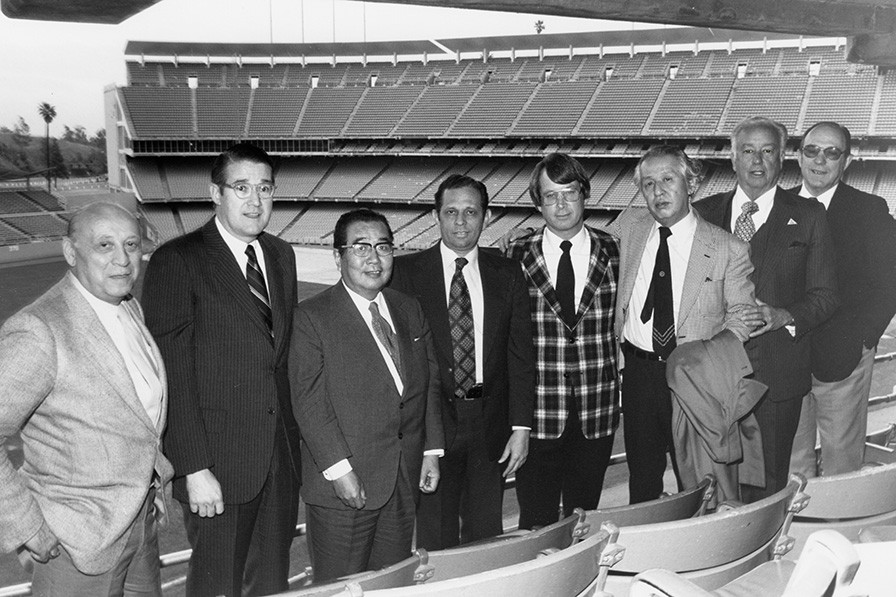
October, 1979, Dodger Stadium, international baseball leaders gather for meetings in Los Angeles to prepare for a presentation to the Los Angeles Olympic Organizing Committee with a pitch for baseball in the 1984 Olympics. (L-R) Bruno Beneck of Italy, President of the European Baseball Association and Vice President of AINBA; Peter O’Malley, Dodger President; Toru Shoriki, owner of the professional Tokyo Yomiuri Giants; Carlos Garcia, Nicaragua and Executive VP of AINBA; Dr. Bob Smith, Chairman of the Board, United States Baseball Federation (USBF); Eiichiro Yamamoto, President, Japan Baseball Federation; Rod Dedeaux, Chairman, U.S. Olympic Baseball Committee and USC head baseball coach; and Danny Litwhiler, International President for the USBF and Michigan State University baseball coach.
In 1979, the international baseball world was very different than it is now.
There was no World Baseball Classic, which didn’t start until 2006
Baseball had rarely been played in the Olympic Games and did not have medal status;
There were no Little League fields in the People’s Republic of China, Nicaragua, and Ireland;
There were no international baseball rankings by country;
Major League Baseball teams rarely scouted for talent outside North America and Latin American countries;
There was no international baseball draft;
International bonuses were limited and not even close to $1 million for a single player, much less six figures;
There was sparse media coverage of international baseball tournaments and international baseball news;
There were no rankings of international baseball prospects by American sports media;
There were no international baseball global sponsors;
International baseball games were rarely televised.
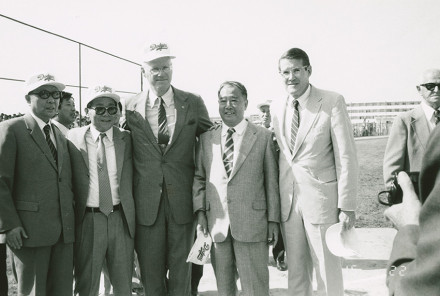
September 12, 1986, Tianjin, People’s Republic of China, (L-R): Ji-Qui Chen, President, Tianjin Institute of Physical Culture; Li Ruihuan, mayor of Tianjin; former Baseball Commissioner Bowie Kuhn; Li Menghua, Minister of Sports, People’s Republic of China; Dodger President Peter O’Malley; and Harry Bardt, member, Dodger Board of Directors. At dedication ceremonies for Dodger Baseball Field, privately built by O’Malley.
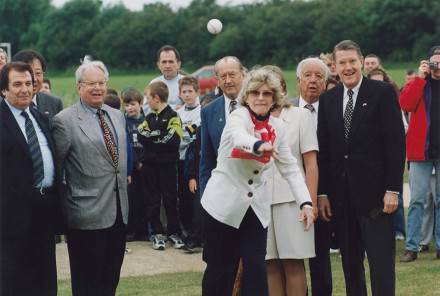
July 4, 1998, Grand Opening Ceremonies for two baseball fields privately built by Peter O’Malley in Corkagh Park, Clondalkin, West Dublin, Ireland, (L-R): Aldo Notari, President, International Baseball Federation; Dr. Creighton Hale, longtime President and CEO, Little League Baseball; Ed Piszek, Little League Foundation Board of Trustees; Jean Kennedy Smith, U.S. Ambassador to Ireland, throws the ceremonial first pitch; Ann Murphy, President, Irish Baseball and Softball Association behind the Ambassador; Rod Dedeaux, legendary USC head baseball coach; and Peter O’Malley.
Since then, there is a World Baseball Classic with major league players participating; baseball returns as a medal sport to the 2028 Los Angeles Olympics at Dodger Stadium; Little League Fields were built in the People’s Republic of China, Ireland, and Nicaragua; every major league team has scouts in countries and attend international tournaments; Major League Baseball has an international draft; international amateur bonuses are regularly above $1 million; media coverage of international baseball events is worldwide; the World Baseball Softball Confederation maintains quarterly top country rankings every year; international games are regularly televised; global sponsors are a part of an international baseball dynamic.
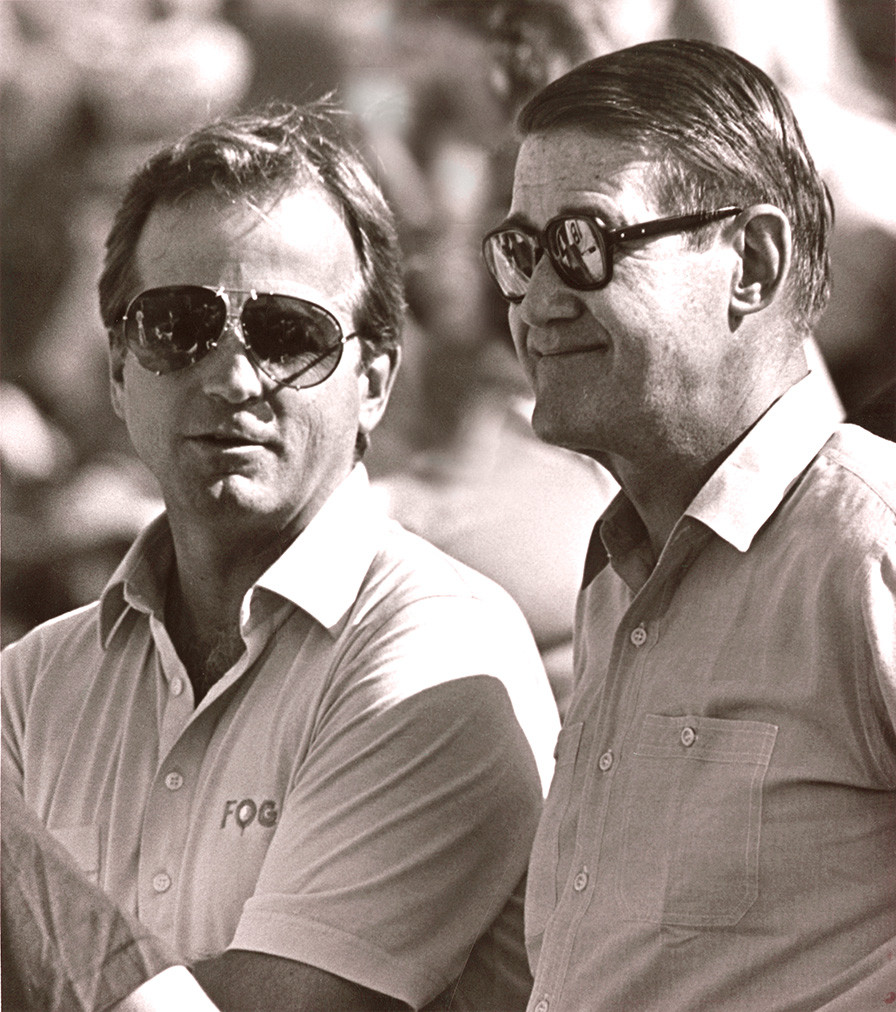
March 9, 1985, Baseball Commissioner Peter Ueberroth is at Holman Stadium, Dodgertown, Vero Beach, Florida for a Dodger exhibition game when the Dodgers hosted the professional Samsung Lions of the Korea Baseball Organization. Ueberroth was President of the Los Angeles Olympic Organizing Committee that approved baseball as one of two demonstration sports for the 1984 Games of the XXIII Olympiad in Los Angeles.
When the Olympic Games in Los Angeles were less than five years away in 1979, O’Malley did not wait long to lobby influential LAOOC officials. In late September, 1979, he, Dedeaux, and John Argue, founding chairman of the LAOOC, met. The next day, O’Malley, Argue and Dedeaux met with Peter Ueberroth, the President and General Manager of the LAOOC. Los Angeles Olympic support was underway. Argue had attended the first day of the 1979 AINBA Extraordinary Congress and said he was impressed by the “unity and presentation of the baseball federation.” He said he felt there was an excellent chance baseball could become a part of the 1984 Olympic Games. Los Angeles Dodgers press release, September 10, 1979
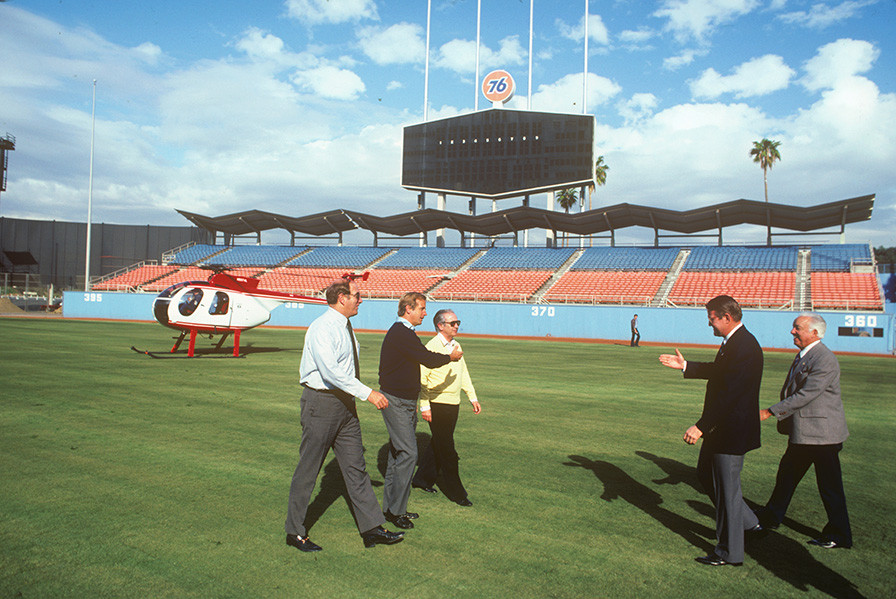
January 16, 1983, International Olympic Committee (IOC) President Juan Antonio Samaranch was in Los Angeles reviewing venues for the 1984 Games of the XXIII Olympiad in Los Angeles and landed by helicopter in right field at Dodger Stadium. (L-R): Chuck Cale, Vice President, Sports Department, Los Angeles Olympic Organizing Committee (LAOOC); Peter Ueberroth, President, LAOOC; Samaranch, President, IOC; Peter O’Malley, Dodger President; and Rod Dedeaux, legendary USC head baseball coach and USA Olympic Baseball head coach.
Nothing was taken for granted in AINBA’s international effort. On April 9, 1981, at a joint meeting of International Sports Federations and the IOC Executive Board with Juan Antonio Samaranch presiding, it was announced that baseball had been approved for demonstration status at the 1984 Games of the XXIII Olympiad in Los Angeles.
Baseball diplomacy crossed all boundaries and territories as the support grew and the enthusiasm deepened. The remarkable and exciting performances of great international baseball players and the tremendous growth in the game can be traced to this seminal AINBA Extraordinary Congress in 1979. Top international players have injected new energy into Major League Baseball.
There were Olympic benefits to those countries who were new to baseball. As a priority, those countries were interested in developing amateur players, teams and facilities. O’Malley said, “…The inclusion of baseball in the Olympics is a big deal because it enables developing countries to get money from the International Olympic Committee to build baseball programs. Ed Odeven, Tokyo Journal, 2020
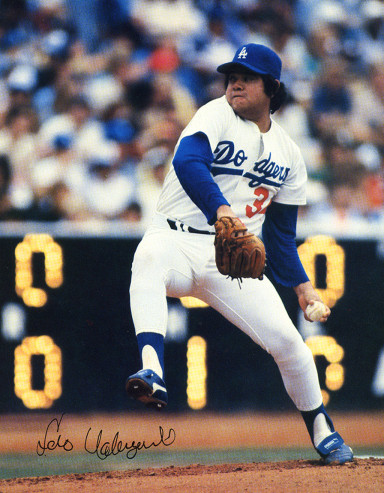
Fernando Valenzuela, Dodger pitcher 1980-1990, renowned for “Fernandomania” in his 1981 National League Rookie of the Year season. He was also 1981 National League Cy Young Award winner. The star from Mexico won three games in 1981 postseason including Game 3 of the 1981 World Series.
For example, on April 9, 1981, the same date that Olympic baseball’s demonstration status was approved for 1984, Fernando Valenzuela of Mexico became the first Dodger rookie pitcher to throw a shutout on Opening Day. It would be the first of eight consecutive wins for Valenzuela including five shutouts as he was on his way to winning the 1981 National League Cy Young Award and the Dodgers won the 1981 World Championship. Valenzuela would go on to a stellar career and baseball took off on international runways.
In 1982, Dr. Shigeyoshi Matsumae, founder and President of Tokai University, Tokyo had the idea that Peter O’Malley should meet in person with the Soviet Union Minister of Sports Sergei Pavlov so they would not be voting against baseball becoming an official Olympic sport. Dr. Matsumae believed that sports and in particular baseball could be a significant bridge connecting Japan, Russia and the United States. Dr. Matsumae wrote a letter of introduction for O’Malley and Akihiro “Ike” Ikuhara, assistant to O’Malley, to hand carry to Russia.
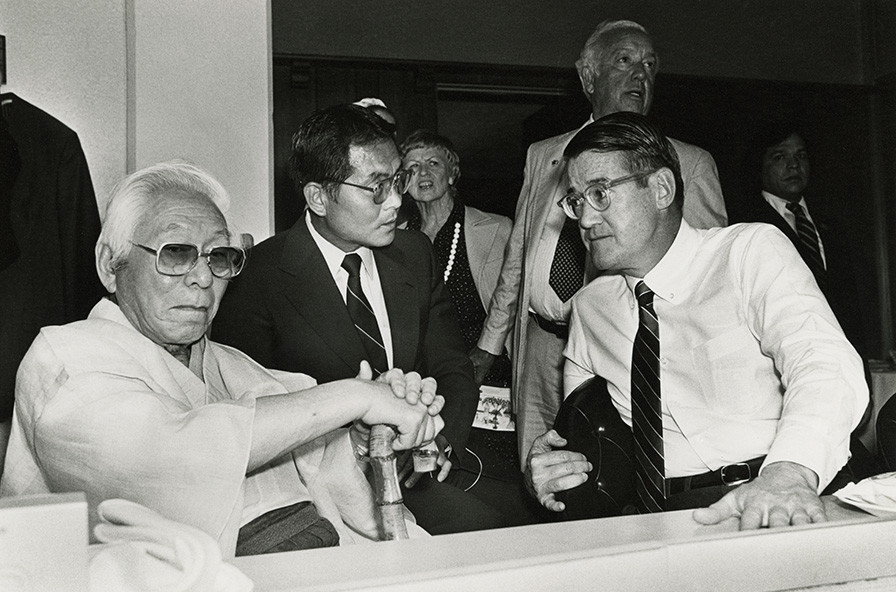
June 14, 1983, Chairman’s Box, Dodger Stadium, (L-R) Dr. Shigeyoshi Matsumae, Founder and President, Tokai University, Tokyo; Ike Ikuhara, Asst. to Dodger President; Dodger President Peter O’Malley. USC Head Baseball Coach Rod Dedeaux stands behind O’Malley.
O’Malley, who had to cancel joining Ikuhara at the last minute, provided the letter of introduction to Ikuhara to hand carry to Pavlov, from Pavlov’s good friend Dr. Matsumae. Ikuhara traveled to Moscow to meet with Pavlov. October 7, 1982 marking the first time baseball in the Western Hemisphere made official contact with the Soviet Union. The meeting, held in Moscow, was also attended by Isao “Dutch” Odachi, baseball coach in Japan and baseball advisor to Dr. Matsumae.
“The message was that we would appreciate it if Russia would not veto baseball and Dr. Matsumae was planning to build a baseball stadium at Moscow State University on Lenin Hill in Moscow,” said O’Malley. “As we were considering our goal, we realized that if baseball became an official Olympic sport significant dollars would be sent to developing countries by the IOC to fund instructors, fields and equipment and that would greatly enhance the growth of baseball.”
Dr. Matsumae’s letter was a success. Ikuhara and Odachi immediately traveled from Moscow to IOC headquarters in Lausanne, Switzerland to meet Dr. Arpad Csanadi (from Hungary), chairman of the IOC Programing Committee, to convey the message about their meeting with Pavlov, who was also president of the USSR National Olympic Committee, and that he would not oppose the movement for baseball to become an official gold medal sport.
Shortly thereafter, on October 12-13, 1982, O’Malley flew to Tokyo to meet with Dr. Matsumae to express his appreciation for the letter that opened the door to Pavlov and his cooperation.
O’Malley stated in 1979, “For a long time, I have had a personal interest in the development of baseball around the world.” Indian River Press Journal, September 23, 1979 He said in a 1991 interview with the international accounting firm Ernst & Young, “So we are seeing tremendous worldwide interest in the game, and I think that will provide advantages in marketing and in sources for talent.” Ernst & Young financial newsletter, Summer, 1991
Dr. Bob Smith said, “The tone of our (1979) meetings was positive, and we are very encouraged about the possibility of having baseball as an Olympic sport in 1984.” Indian River Press Journal, September 23, 1979 Commissioner Kuhn said, “We (Major League Baseball) will give support to the United States Baseball Federation so it can assist baseball in an international effort.” Indian River Press Journal, September 23, 1979
Bill Arce, a noted collegiate baseball coach had vast experience in international baseball. Arce led championship baseball teams for the Claremont Men’s College and an early pioneer of international baseball in the United States. He is the first recorded American baseball coach to provide instruction to Sweden, Czechoslovakia, Yugoslavia, and the People’s Republic of China. Arce was head coach of the national baseball teams in Italy and the Netherlands, leading them to European Championships. He is credited with introducing Peter O’Malley to PRC baseball officials in 1980 eventually leading to privately built Dodger Baseball Field in Tianjin.
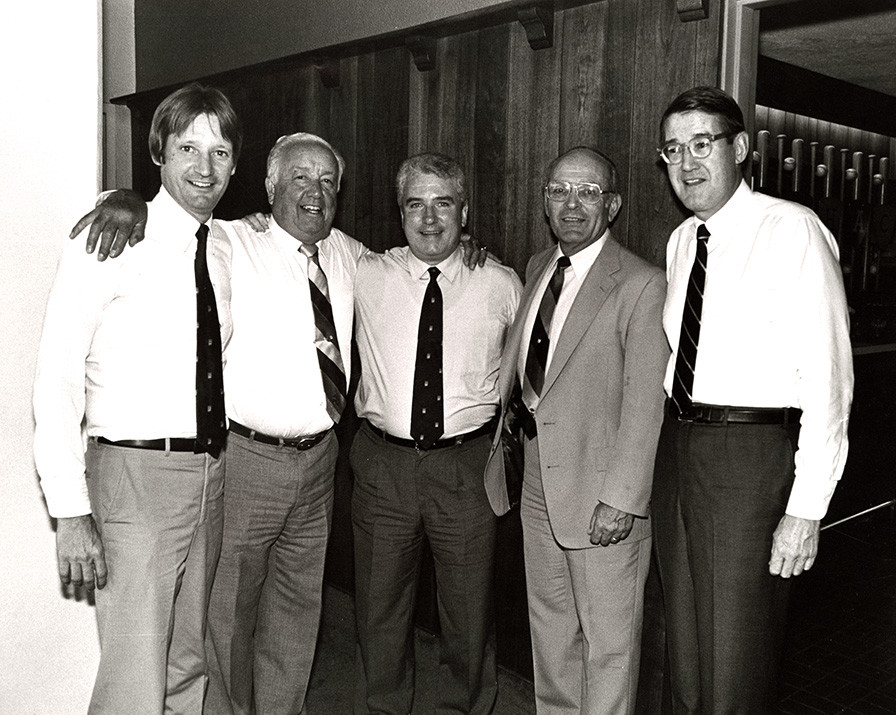
June 1, 1987, Dodger Stadium, (L-R): David Osinski, Executive Director, IBA; Rod Dedeaux, legendary USC head baseball coach; Miguel Ortin, President, Royal Spanish Baseball Federation; Dr. Bill Arce, international baseball coach and longtime head baseball coach, Claremont Men’s College; and Peter O’Malley.
Photo by Jon SooHoo/Los Angeles Dodgers
Arce attended the September 1979 Olympic meeting and gave his unconditional backing to the goal of baseball in the Summer Games. Following the meeting, he wrote Peter O’Malley, “The Los Angeles meeting was the finest gathering of international baseball people I have had the privilege to attend or observe…I also know full well that the USB could never have pulled off such a coup without your complete endorsement of these meetings and subsidization of them. Please accept my appreciation for what you have done for baseball in general and specifically for the United States Baseball Federation.”
On September 20, 1979, Guus van der Heijden, president of the Netherlands Baseball and Softball Federation (KNBSB) writes O’Malley to express his appreciation of the AINBA Extraordinary Congress in Los Angeles. “I think that you yourself have done a tremendous good job for international baseball by inviting us and developing such a good program. As I have felt, it was in particular appreciated that you have spent so many extra hours outside the schedule items with us, for instance the breakfast time. May be there was sometimes a hip, hip, hurrah sphere, but anyhow there was the feeling amongst all of us that we are working on a project of common interest. As far as I can remember this was the first time in history that a man in your position took such an initiative…Let us hope that we succeed in bringing baseball at the Olympic’s program, of course with Holland as one of the participating teams.” Letter from Guus van der Heijden, Koninklijke Nederlandse (KNBSB) to Peter O’Malley, September 20, 1979
A massive step forward for baseball in the 1984 Games of the XXIII Olympiad in Los Angeles was the commitment by Peter O’Malley and the Dodgers to guarantee to the LAOOC and the taxpayers that there would not be a financial loss on baseball for games played at Dodger Stadium.
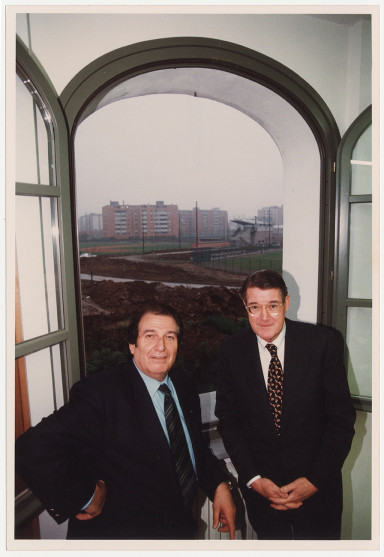
November 11, 1996 in Parma, Italy, International Baseball Federation President Aldo Notari (left) with Dodger President Peter O’Malley viewing construction of Quadrifoglio, a baseball complex.
Photo by di Pier Luigi Vasini, Parma, Italy. All Rights Reserved.
In 1993, Aldo Notari, President of the Italian Baseball Federation and Vice President of the International Baseball Federation who attended the 1979 meeting in Los Angeles spoke of the multiplier effect from the 1984 Olympic Games for baseball. Notari said, “In Europe, 30 countries now play baseball. Twenty years ago, there were only 11. The boom resulted from baseball’s acceptance as an Olympic sport. Before Barcelona in 1992, it was a demonstration sport at the Los Angeles Olympics, thanks to Peter O’Malley of the Los Angeles Dodgers who has given us so much help and encouragement.” Hugh Milligan, Everyday Magazine, St. Louis Post-Dispatch, June 20, 1993
In a 2012 interview, O’Malley said, “The future of international baseball is bright and we see every day more and more countries are beginning baseball programs. Olympic baseball is necessary for that vision.” O’Malley told of the strategy they used to convince the International Olympic Committee. “Our work included many meetings, international travel and frequent conference calls. Our strategy was to broaden the base and contact everyone we knew who could help us get the necessary IOC votes. Matthew Grayson, Around the Rings, October 25, 2012
Daisuke Matsuzaka, who had pitched in Japan and for the Boston Red Sox told the World Baseball Softball Confederation in 2024 of the importance of international competition. Matsuzaka said, “I always aimed to be selected for the National Team because I realized that playing internationally, I would experience something I would not have the possibility to see playing in Japanese baseball,” he added. “Playing internationally has helped me adjust to the different styles of baseball.” World Baseball Softball Confederation, February 12, 2024
The baseball leaders of their countries then at the 1979 meeting knew the strength of their pitch could not start with the highest professional leagues. Baseball in the Olympic Games still maintain their official “amateur” status for athletes.
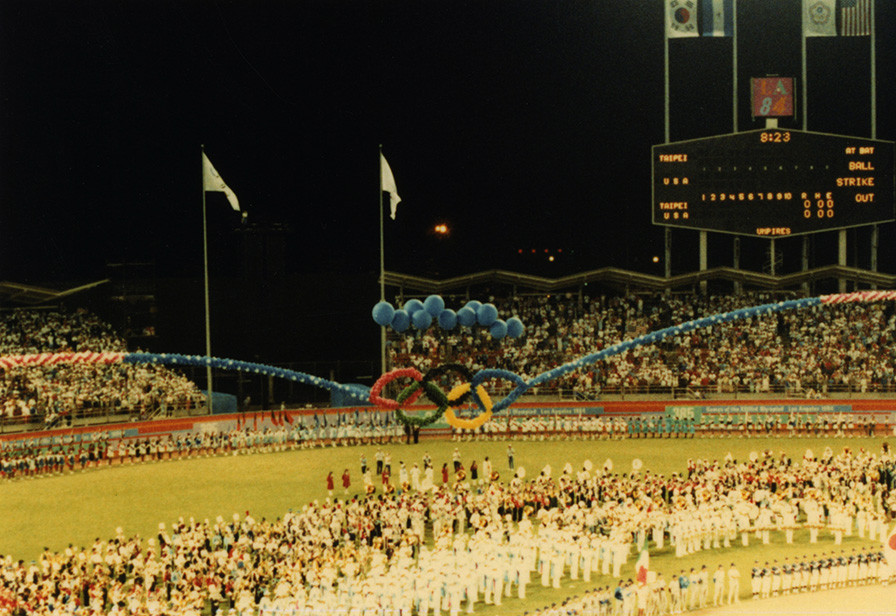
July 31, 1984, special and colorful Opening Ceremonies were held at Dodger Stadium for the eight-team Olympic Baseball exhibition tournament. Baseball was a demonstration sport in 1984, but gained gold medal status by the IOC for the 1992 Barcelona Games.
The successful efforts of the 1979 meeting of international baseball officials would be well rewarded. Five years later, baseball was a massive success for the 1984 Games of the XXIII Olympiad in Los Angeles. Baseball attendance for the eight-team exhibition tournament at Dodger Stadium drew the third largest attendance for a 1984 Olympic sport, trailing only the perennial Olympic favorites of track and field and soccer and those sports played in venues with much larger seating capacities – the Los Angeles Memorial Coliseum and the Rose Bowl in Pasadena.
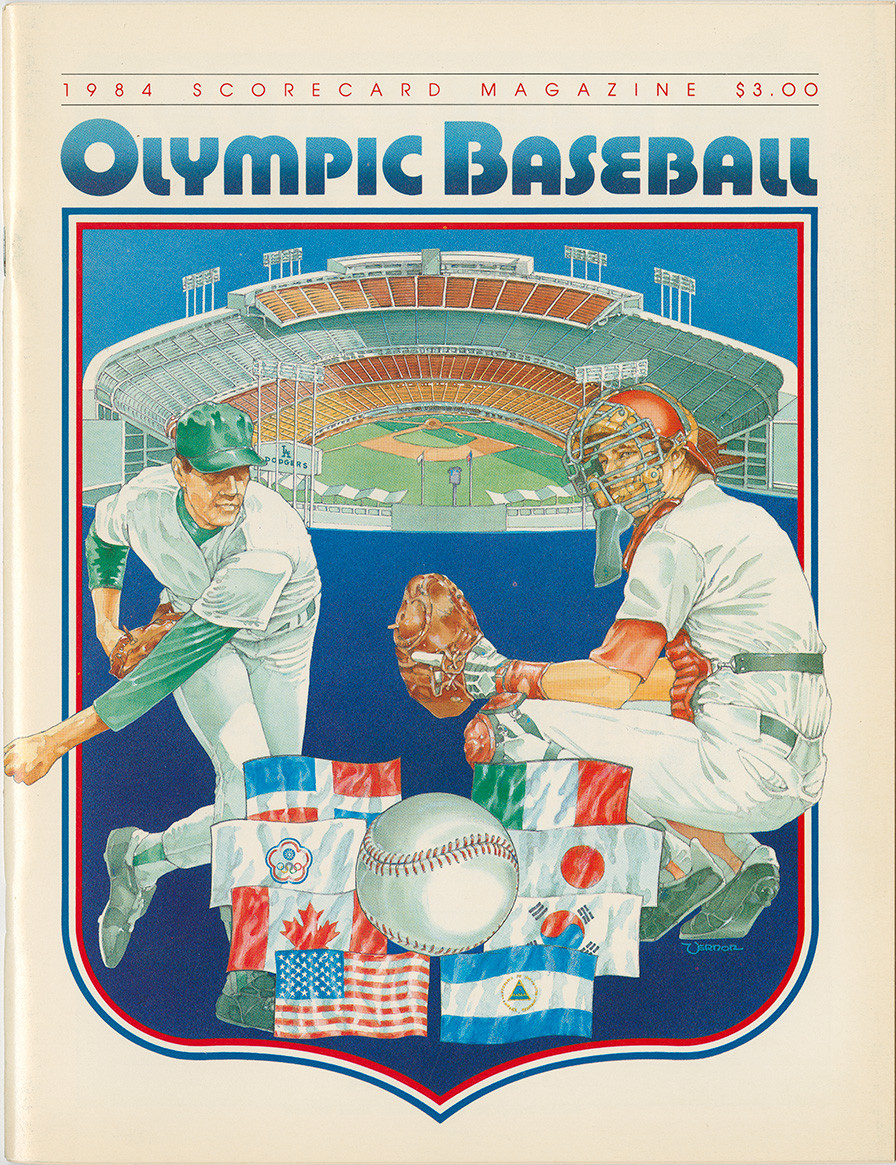
Program cover from the Olympic Baseball eight-team exhibition tournament at Dodger Stadium, July 31-August 7, 1984 as part of the Games of the XXIII Olympiad in Los Angeles. The artwork depicts Dodger Stadium and a baseball with flags of the eight competing nations: U.S., Canada, Chinese Taipei, Dominican Republic, Italy, Japan, South Korea and Nicaragua.
USC Head Baseball Coach Rod Dedeaux said when more than 385,000 persons attended, “That was the greatest single event ever for amateur baseball. The games averaged 48,000 fans a game, and they sold out each time the United States was playing.” Sid Robinson, Dodger Magazine, Los Angeles Dodgers, Summer, 1992 Even with early morning (10 a.m.) and early afternoon (1 p.m.) games, baseball was a hit with fans.
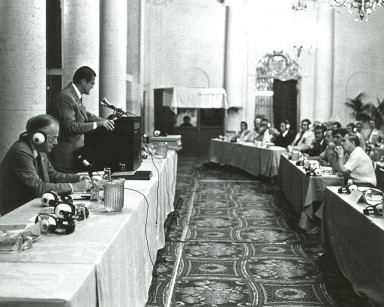
September 10, 1979, Dodger President Peter O’Malley welcomes representatives of AINBA to an Extraordinary Congress at the Biltmore in Los Angeles. This meeting, organized and hosted by O’Malley, brought together leaders from 30 countries to establish a plan for supporting baseball in the Olympic Games.
In a feature by Kevin Baxter for Baseball America in 1996, he wrote, “(Dr. Robert) Smith (former president of the International Baseball Association) unreservedly credits O’Malley for pushing baseball into the Olympics. He says a World Baseball Congress O’Malley staged in Los Angeles in 1979 put the proposal clearly on the table. When O’Malley offered to host baseball’s first trial in 1984 as a demonstration sport at Dodger Stadium — and moreover, guaranteed its financial success — the push gained substantial momentum. That competition drew more than 350,000 fans, which further impressed the International Olympic Committee.” January 7, 1996, Kevin Baxter, Baseball America As O’Malley completed his final season as President of the Los Angeles Dodgers, New Yorker magazine wrote, “Under O’Malley’s aegis, the Dodgers have developed and signed foreign players (Hideo Nomo and Chan Ho Park), hosted foreign teams, played exhibition games in a number of countries and helped to bring baseball to the Olympics.” December 8, 1997, Connie Bruck, The New Yorker
The 1984 Olympics were only the first inning for international baseball growth. During the 1980s, baseball established new footholds that increased by 21 countries through the 1980s decade, nearly equaling the growth of the three previous decades. O’Malley’s international efforts continued following the 1984 Olympics. He worked with international baseball leaders and countries to continue baseball in Seoul in 1988, Barcelona in 1992, Atlanta in 1996, Sydney in 2000, Athens in 2004, and Beijing in 2008. Dr. Bob Smith said “O’Malley has also been a major force in the development of baseball in China, Russia, Dominican Republic and other countries that enabled the IBA to reach the minimum number of countries required by the IOC for consideration as an Olympic sport.” March 6, 1992, Collegiate Baseball, Dr. Bob Smith
From 1990 to 1999, baseball’s international society added another 26 countries in the decade. As the world entered the 21st century, there has been another quantum leap which has introduced 37 countries to join the World Baseball Softball Confederation with such countries as Afghanistan, Congo, Cyprus, Egypt, and New Zealand to bring the total to 128.
From 1980 to 1999, 44 players born in Mexico would make their major league debut, a greater figure than the 37 Mexicans major league players in the previous 46 years (1933-1979). Baseball Almanac, “Major League Players Born in Mexico.”
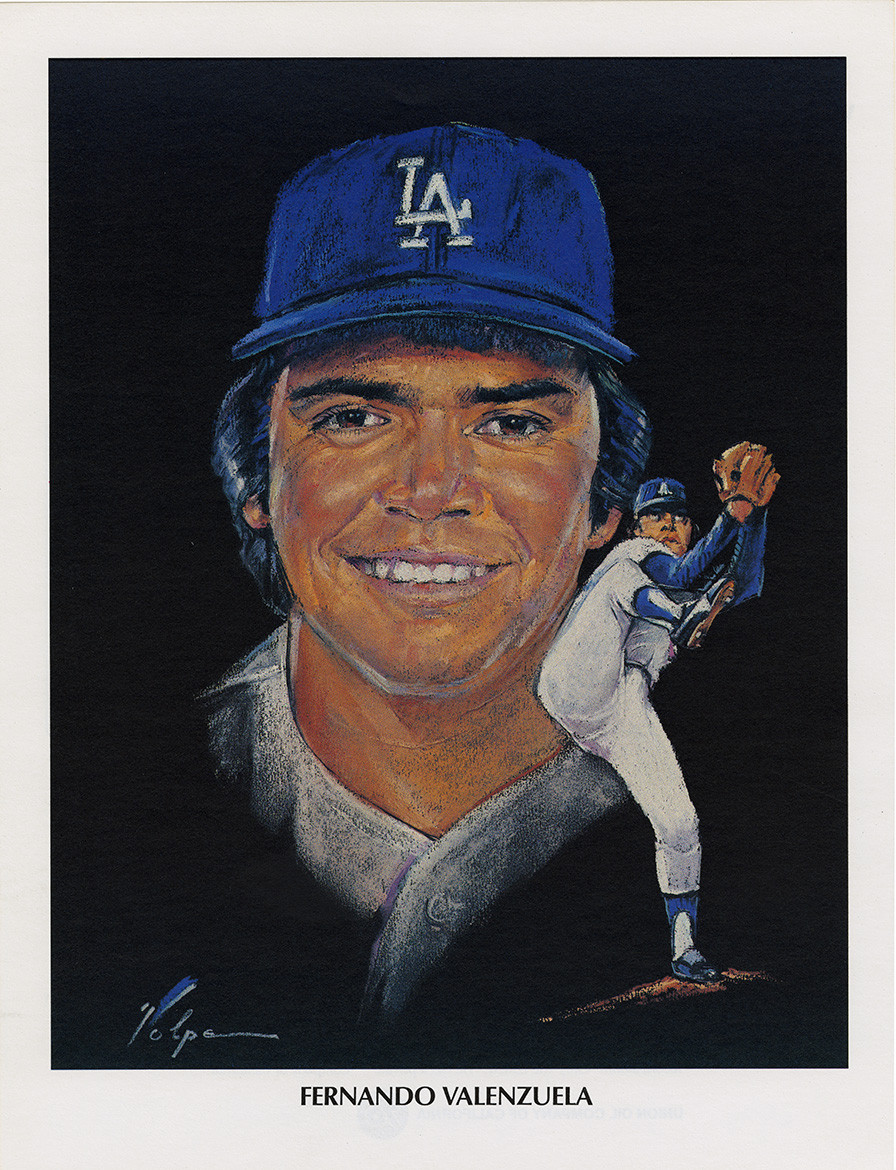
Dodger pitcher Fernando Valenzuela’s portrait is depicted in the 1982 Union Oil promotional series by highly-respected artist Nicholas Volpe.
This growth in the number of major league players from Mexico stems from in large part from the Los Angeles Dodgers. The Dodgers were at the forefront for Mexico and paid top dollar for value. Their signing of Mexico’s Fernando Valenzuela to a 1979 minor league contract was for an amount that ranked among the highest bonuses paid in the 1979 Free Agent Draft. After Valenzuela’s phenomenal success, clubs began to pay more serious attention to scouting and developing talent in Mexico.
The Dodgers continued to break new ground internationally with major league debuts of Australian Craig Shipley in 1986, South Korean pitcher Chan Ho Park in 1994, and Hideo Nomo from Japan in 1995.
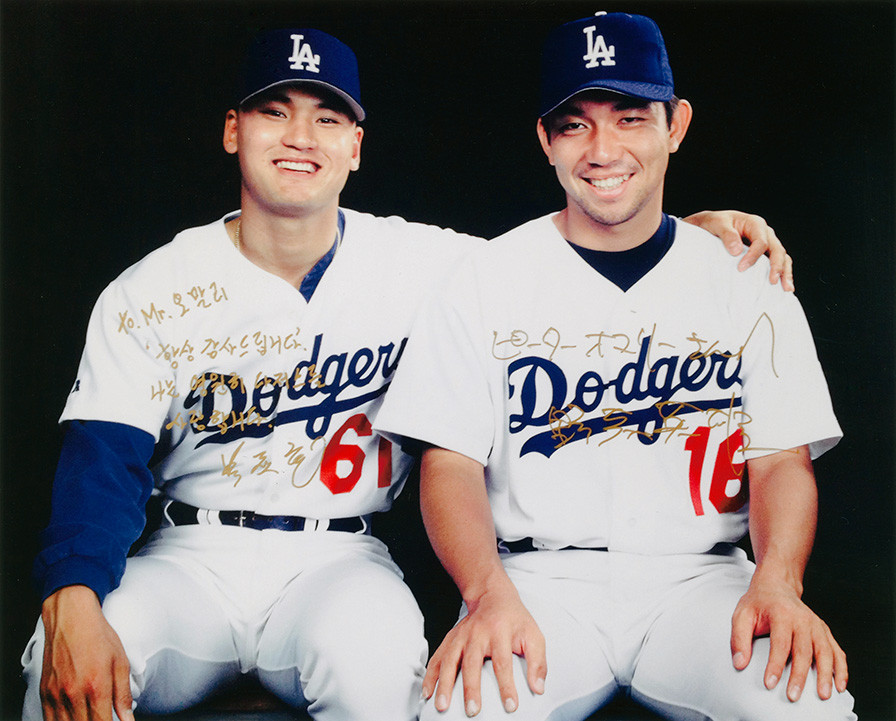
March, 1995, Dodgertown, Vero Beach, Florida (L-R) Chan Ho Park and Hideo Nomo. Pioneer pitchers Park and Nomo signed the photo to Dodger President Peter O’Malley. In 1994, Park became the first South Korea-born player in the major leagues, while in 1995 Nomo signed with the Dodgers was the first Japan-born player in the major leagues since 1965.
Photo by Jon SooHoo/Los Angeles Dodgers
The signing of Nomo from Japan would eventually lead to the 2001 Seattle Mariners’ signing of Ichiro Suzuki, elected to the National Baseball Hall of Fame in 2025. Suzuki was asked when he first started to think of playing in the major leagues. Suzuki said, “When I began, I never thought about it much. A really big influence was when (Hideo) Nomo signed a contract to play in the major leagues with the Dodgers. Up until then, it was merely an image in my mind, but when I saw Nomo play on television, the thought of playing in America became much clearer.” Jeff Idelson, Memories and Dreams, July/August 2006 Since the signing of Nomo in 1995 to a Dodger contract, more than 80 players from Japan (to start the 2025 season) have played in the majors, a tremendous resource of talent when there was only one player from Japan from 1890 to 1964. Baseball Almanac, Major League Players Born in Japan.
O’Malley spoke of his great appreciation for the baseball leaders from the numerous countries for their growth of international baseball. In a 2012 interview, he especially cited the leadership of Riccardo Fraccari, the head of the World Baseball Softball Confederation. “I admire the thorough planning of President Fraccari and I believe his approach to proceed with the International Softball Association is wise. This merger of the two sports greatly enhances the chances of both sports returning to the Olympics.” Matthew Grayson, Around the Rings, October 25, 2012
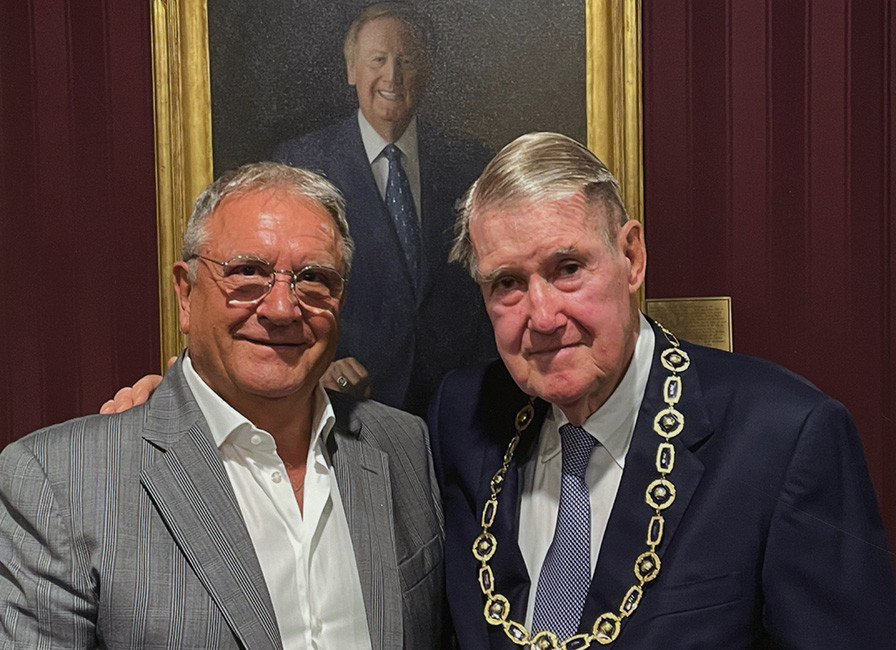
July 19, 2022, the Reagan Room at the Jonathan Club, Los Angeles, (L-R) Riccardo Fraccari, President, World Baseball Softball Confederation, and Peter O’Malley. Peter accepts the “Order of Honor” from Fraccari for his longtime commitment to international baseball.
Another measuring stick for the growth of baseball internationally since 1979 would be the number of players born in a foreign country to debut in the major leagues. Before 1979, there were many countries which had never produced a major league player. After 1979, debuts in the big leagues have been made by players born in Aruba; Belize; Brazil; Curacao; Germany; Honduras; Ireland; Italy; Jamaica; Lithuania; Peru; Scotland; South Africa; South Korea; Spain; and Taiwan. Baseball Almanac
(Editor’s note -- Several countries can claim a major leaguer has been born in their country, i.e. Afghanistan; Belgium; Hong Kong; England; France; Guam; Indonesia; Russia; Singapore; and South Vietnam. Many of these players have U.S. birthright because both or either of their parents are American.)
International Baseball Rundown wrote in Winter, 1998, “Peter O’Malley has supported and promoted international baseball at both the amateur and professional levels. O’Malley has been credited with playing a major role in baseball being recognized as an Olympic sport by the International Olympic Committee. Winter, 1998, International Baseball Rundown
Dr. Robert Smith, then president of the International Baseball Federation would say in 1992, “I believe that Peter O’Malley is probably the single-most important person in getting baseball into the Olympics. The Dodgers have been absolutely marvelous in what they have done to help the game internationally. No organization has done more, and few have come anywhere close.” 1992, Sid Robinson, Dodgers Magazine, Los Angeles Dodgers
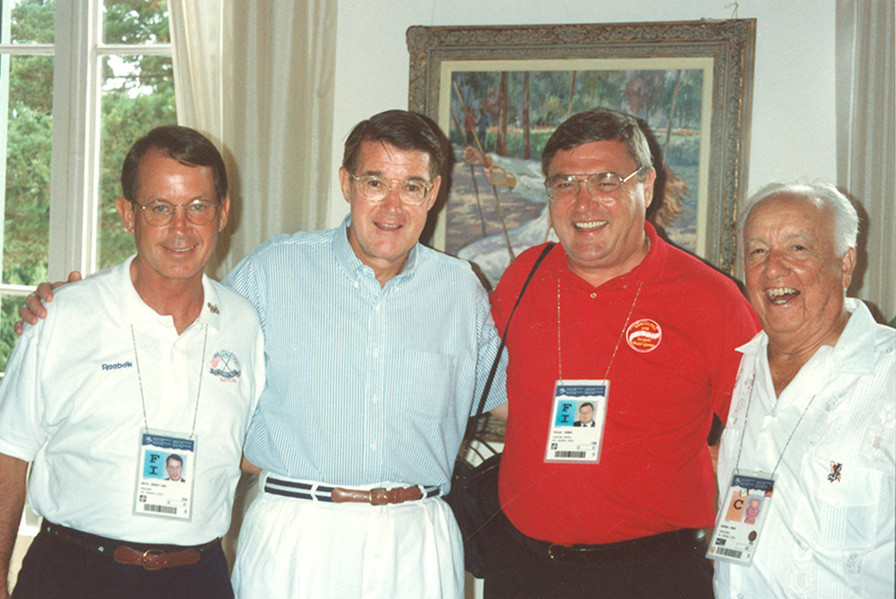
July, 1992, Barcelona, Spain, (L-R) Dr. Bob Smith, President, International Baseball Association; Dodger President Peter O’Malley; Cas Pielak, President, Baseball Canada; and Rod Dedeaux, legendary USC head baseball coach enjoy a luncheon hosted by O’Malley for the IBA to celebrate baseball as an official Olympic sport.
And now with the Olympic Games set to return to Los Angeles in 2028, so does international baseball return to the city of its foundation as Dodger Stadium will again be the site of the tournament.
In an interview in 2024, O’Malley shared his vision with the organization’s scouts. “About 25 years ago, I met with our scouts here in Los Angeles from across the country. I said, ‘Go out and get a passport. If you’re going to scout and look for talent, every scout must have a passport. Even if your area is the Midwest.’ As I saw it, the search for talent and availability of talent around the world would grow and grow and grow.” 2024, Anthony Al-Jamie, Tokyo Journal #283,
And it has.

